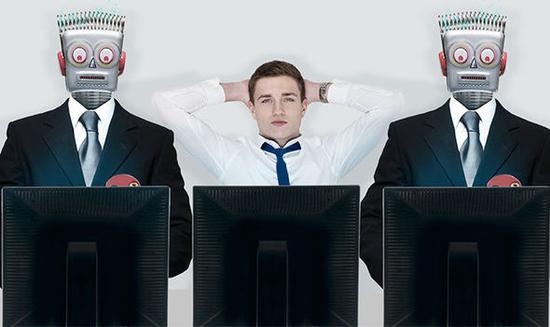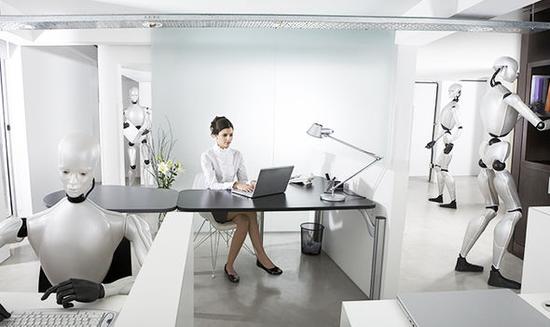
This article is produced by NetEase Smart Studio (public number smartman 163). Focus on AI and read the next big era!
[Netease smart news August 9 news] Artificial intelligence has been everywhere, technology giants are arguing whether this is good or bad. This has also triggered a very important social issue: Will the emergence of artificial intelligence lead to the stratification of social classes, and will it create a world where the gap between the rich and the poor is more pronounced?
New career model to be seen
Artificial intelligence has had an impact on many industries, and in the coming years, robotics and automated production will replace the work of many blue-collar and white-collar workers. The speed and severity of this situation have become serious challenges faced by all countries in the world. Coupled with the geopolitical influence, even some low-end artificial intelligence will be regarded as a terrible thing. Recently, this was outlined in an important action proposed by Kai-Fu Lee.
Therefore, we need to actively create new career models to deal with the impact of artificial intelligence on human work. Let us look at what will change in the short term (in 10 years), medium term (10-20 years), and long term (20 years).
Blue Collar: You Will Face the Risk of Lost Your Job
With the development of artificial intelligence, most of the blue-collar work is the first to be affected, becoming the first group of people affected by it. However, from a political point of view, this may not lead to the introduction of major national policies, because high-income earners will not be affected by changes in employment, but instead may benefit from the positive impact of artificial intelligence. .
As auto-driving cars replace taxi drivers, this will make traffic safer, faster, and more convenient. It may even solve the problem of finding parking spaces today. Robots replace the repetitive work in the factory's workshop, which will reduce the production cost, and then bring more cheap goods to the society. All these good developments mean that blue-collar workers will inevitably face the risk of losing their jobs.

Unless plans are formulated in advance, we may see the polarization of society. Through vocational training, we will develop skills that will not be replaced by artificial intelligence to achieve a "soft landing." For some people, this may be a heavy interpersonal work, while for others it is necessary to learn to work with artificial intelligence and even to program artificial intelligence. But on the whole, this may be a very difficult time for people with a weak educational background.
Artificial intelligence development will become a new normal
It is expected that as of the end of the 20th century, the development of artificial intelligence will become the norm, and most blue-collar jobs may become the epitome of their history. In addition, white-collar workers in areas such as healthcare and financial services will also face this pressure: When artificial intelligence brings accurate, efficient, and affordable services, whoever needs a laboratory technician to interpret x-rays for you What about tablets? But what is certain is that white-collar workers will face pressure before this, but this will take some time before a significant change in career choices takes place. Whether it is good or bad, this will happen and bring about huge social changes.
More white-collar workers will turn to work that can only be done by humans, and these jobs are limited. It is possible that a low-level programmer can quickly learn to program artificial intelligence, but those who do not understand technology, such as lawyers, will be eliminated from their jobs and they will face a formidable transformation.

A highly stratified society is about to emerge
At present, people still have no intention of artificial intelligence, but within the next two decades, artificial intelligence will appear as intelligent as humans. This may bring great benefits to society because it allows a friendly and powerful artificial intelligence to work with humans or work for humans. It will be a highly stratified society with a strong artificial intelligence. There is no conflict between humans and people without artificial intelligence, or it may be that humans and artificial intelligence achieve good integration, making us stronger than they are now.
For those lucky enough to possess and have the ability to control the best artificial intelligence, they may dominate the society by consolidating wealth, power, and insight. This raises the basic question of whether artificial intelligence should be controlled by large technology companies or should it be spread more widely in the lives of the people. There is also a complicated issue, that is, artificial intelligence has the best effect in using network effects. Therefore, it is foolish and outdated to divide large companies like Amazon and Baidu into smaller ones. No matter who has the best artificial intelligence, network effects need to be maintained. Otherwise, the advantages of artificial intelligence will no longer exist. To be sure, Google and other companies have already opened up some artificial intelligence to the general public, but obviously they have the best technology in their hands.

Improve taxes, knowledge sharing or government takeovers?
Some wise people believe that the rise and concentration of artificial intelligence will require raising tax rates to provide social benefits for those who will be replaced in society. This is certainly a good choice, which can allow people to do useful but low-paid work, or let them achieve lifelong learning. But if there is no obvious social conflict, it is very difficult to achieve this.
Another option is to create big data that provides artificial intelligence and basic artificial intelligence modules to everyone, that is, to share data and artificial intelligence knowledge. This will allow blue-collar workers and white-collar workers and professionals to innovate and create SMEs that can use artificial intelligence to grow. This will require strong government intervention but it also needs to give the private sector certain rights rather than just tax it.
Another option is to place the best artificial intelligence in the hands of the government so that people can pursue their ideals from the wealth created by the government while meeting their basic needs. This is the future of Star Trek in science fiction, but it is likely that not everyone will be satisfied with the government. In fact, the concept of money has become obsolete in this society.

All this is the effect of artificial intelligence on foreign policy. If you live in the United States or China, you feel very lucky: because you can have more choices in the rise of artificial intelligence. At the very least, the two countries need not be tangled in how to deal with the limited power generated by the technological revolution in other countries.
What does this all mean? Are we moving toward a world divided between rich and poor? Perhaps if we are honest, thoughtful, and forward-looking, we can choose different paths. Artificial intelligence will continue to develop and bring us many positive results. Negative descriptions in science fiction may or may not happen. At the same time, it will have a huge impact on society. Therefore, we must try to find a way out for ourselves before the "disaster" and actively seek out the best solution. (Selected from: VB Author: ED SAPPIN compile: NetEase see foreign intelligence platform compiler revision: Towers)
Auto Radiator,Car Radiator,Car Coolant,Car Engine Coolant
Huangshan Kaichi Technology Co.,Ltd , https://www.kaichitech.com